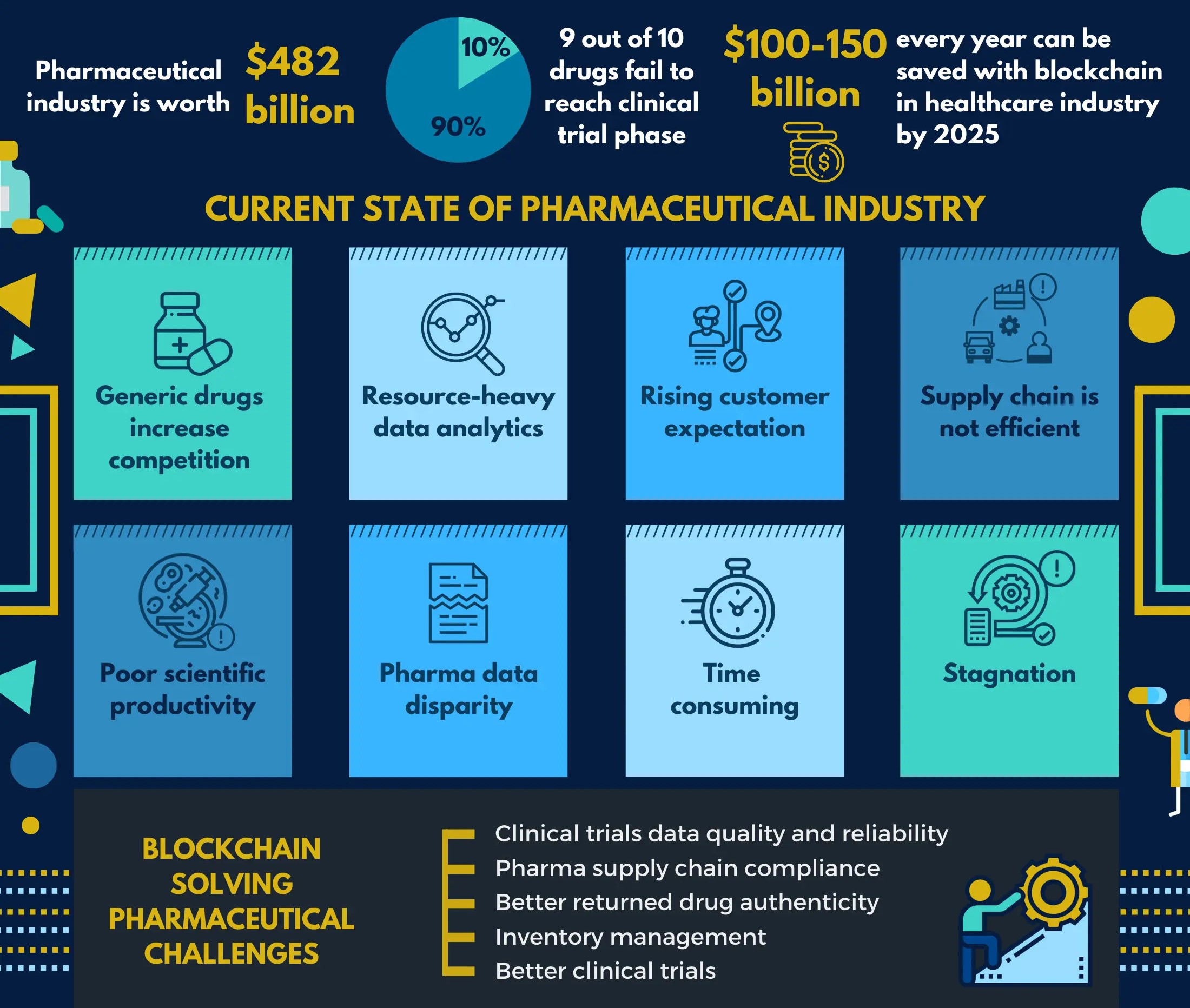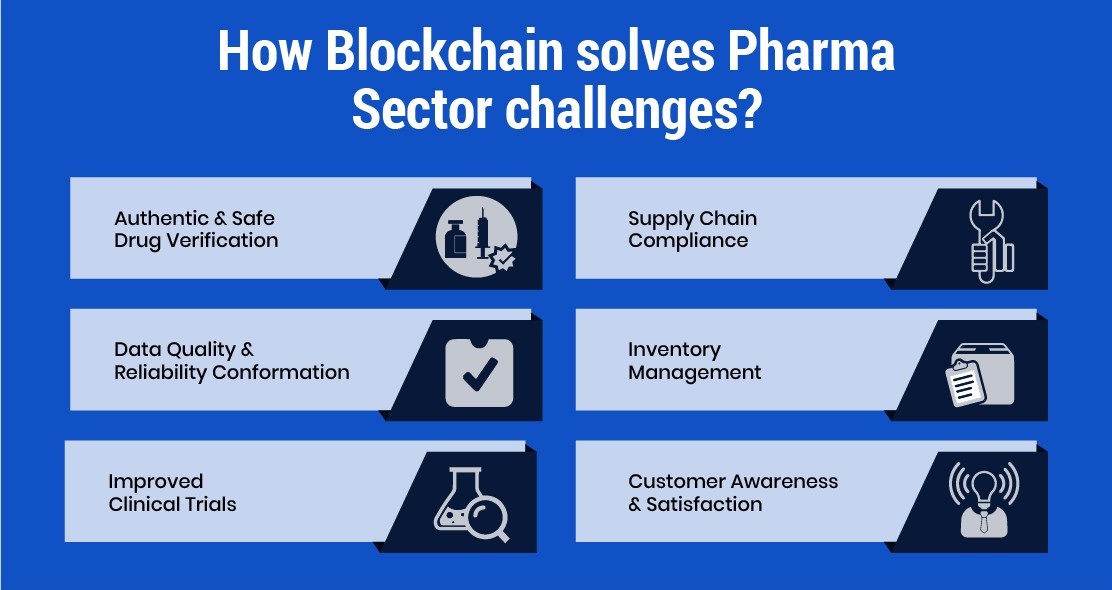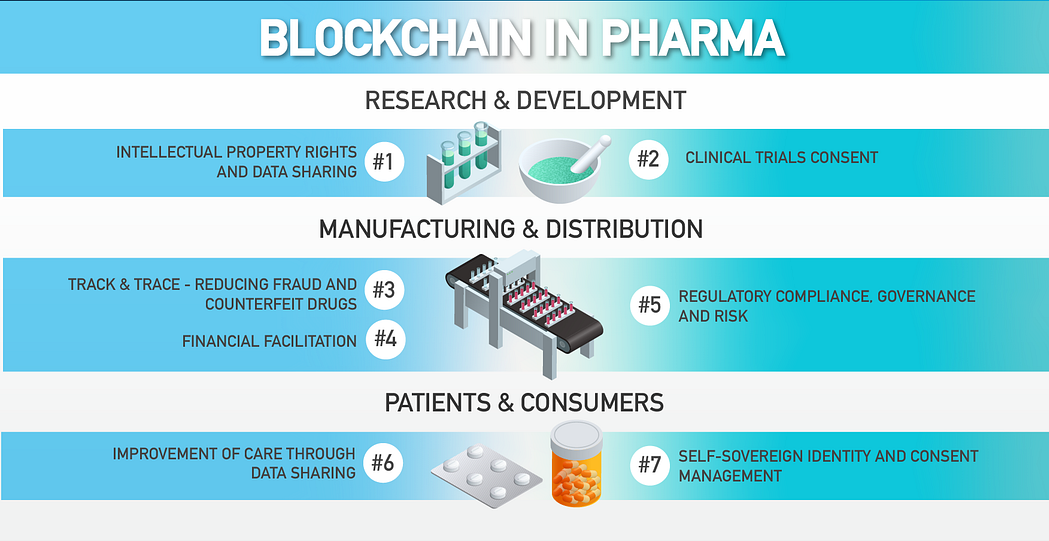SERVICES BY US
Pharmaceutical & Blockchain
Blockchain technology can be useful in Pharmaceutical:
Supply chain transparency: The pharmaceutical supply chain is complex and involves multiple parties, including manufacturers, distributors, wholesalers, and pharmacies. Blockchain can provide a secure, tamper-proof record of the entire supply chain, making it easier to track the movement of drugs from production to distribution. This can help prevent counterfeit drugs from entering the market, reduce the risk of drug diversion, and increase patient safety. For example, blockchain can be used to track the origin and movement of opioids to prevent diversion and abuse.

Clinical trials: Clinical trials are an essential part of drug development, but the process can be slow, costly, and prone to fraud. Blockchain can provide a decentralized, secure platform for managing, sharing, and analyzing clinical trial data. This can improve the transparency and integrity of clinical trial data, reduce fraud, and speed up the drug development process. For example, blockchain can be used to securely manage patient consent, anonymize data, and ensure data integrity.
Drug authenticity verification: Counterfeit drugs are a significant problem in the pharmaceutical industry, with an estimated 10% of drugs sold worldwide being fake. Blockchain can be used to create a secure, immutable record of a drug’s authenticity, from production to dispensing. This can help prevent counterfeit drugs from entering the market and ensure that patients receive genuine medications. For example, blockchain can be used to track the authenticity of vaccines to prevent counterfeits from being distributed.
Patient data privacy: Patient data privacy is a critical concern in healthcare, with sensitive medical information being vulnerable to hacking and other cybersecurity threats. Blockchain can be used to create a decentralized, secure platform for patient data management and sharing. This can help protect patient privacy and prevent unauthorized access to sensitive medical information. For example, blockchain can be used to create a secure, decentralized electronic health record (EHR) system that patients can control and share as needed.
Drug recalls: Drug recalls can occur for a variety of reasons, including safety concerns, manufacturing defects, and packaging issues. Blockchain can be used to quickly identify and trace the origin of a drug in the event of a recall. This can help prevent further distribution of the affected product and reduce the risk of harm to patients. For example, blockchain can be used to track the origin of contaminated drugs and identify the source of the problem.

Overall, blockchain has the potential to revolutionize the pharmaceutical industry by improving supply chain transparency, accelerating drug development, preventing counterfeits, protecting patient privacy, and enhancing patient safety.
Few blockchain case studies for Pharmaceutical:

-
MediLedger: MediLedger is a blockchain-based platform developed by San Francisco-based blockchain firm Chronicled. It is designed to prevent counterfeit drugs from entering the pharmaceutical supply chain. The platform uses a combination of blockchain and cryptography to create a secure, tamper-proof record of drug movements. It allows manufacturers, wholesalers, and pharmacies to verify the authenticity of drugs, preventing the distribution of counterfeit drugs.
-
The Drug Supply Chain Security Act (DSCSA): The DSCSA is a federal law that requires pharmaceutical companies to implement a track-and-trace system for drugs. In response, several blockchain-based solutions have emerged. For example, blockchain firm Viant has developed a solution that uses blockchain to create a secure, tamper-proof record of the entire drug supply chain.
-
Project RxChain: Project RxChain is a blockchain-based solution developed by IBM and Chinese firm Zhejiang Huahai Pharmaceutical. It is designed to improve the transparency and efficiency of the clinical trial process. The solution uses blockchain to securely manage and share clinical trial data, making it easier to track the progress of clinical trials and improve data quality.
-
Genentech: Genentech, a leading biotechnology company, has implemented a blockchain-based solution for drug recalls. The solution allows the company to quickly identify the source of a recalled drug, enabling them to remove the product from the market more efficiently and effectively.
-
PharmaLedger: PharmaLedger is a blockchain-based consortium made up of several pharmaceutical companies, academic institutions, and technology firms. The consortium is working on several blockchain-based solutions, including a platform for managing clinical trial data and a platform for tracking the authenticity of drugs.
Overall, these case studies demonstrate the potential of blockchain to transform the pharmaceutical industry by improving supply chain transparency, preventing counterfeits, accelerating drug development, and enhancing patient safety.
Services categories
About us

Our goal is to help our clients achieve their online goals by providing them with customized, effective, and results-driven solutions that drive growth, increase visibility, and strengthen their online presence.
Contact info
Address office
USA, INDIA, VIETNAM
Phone